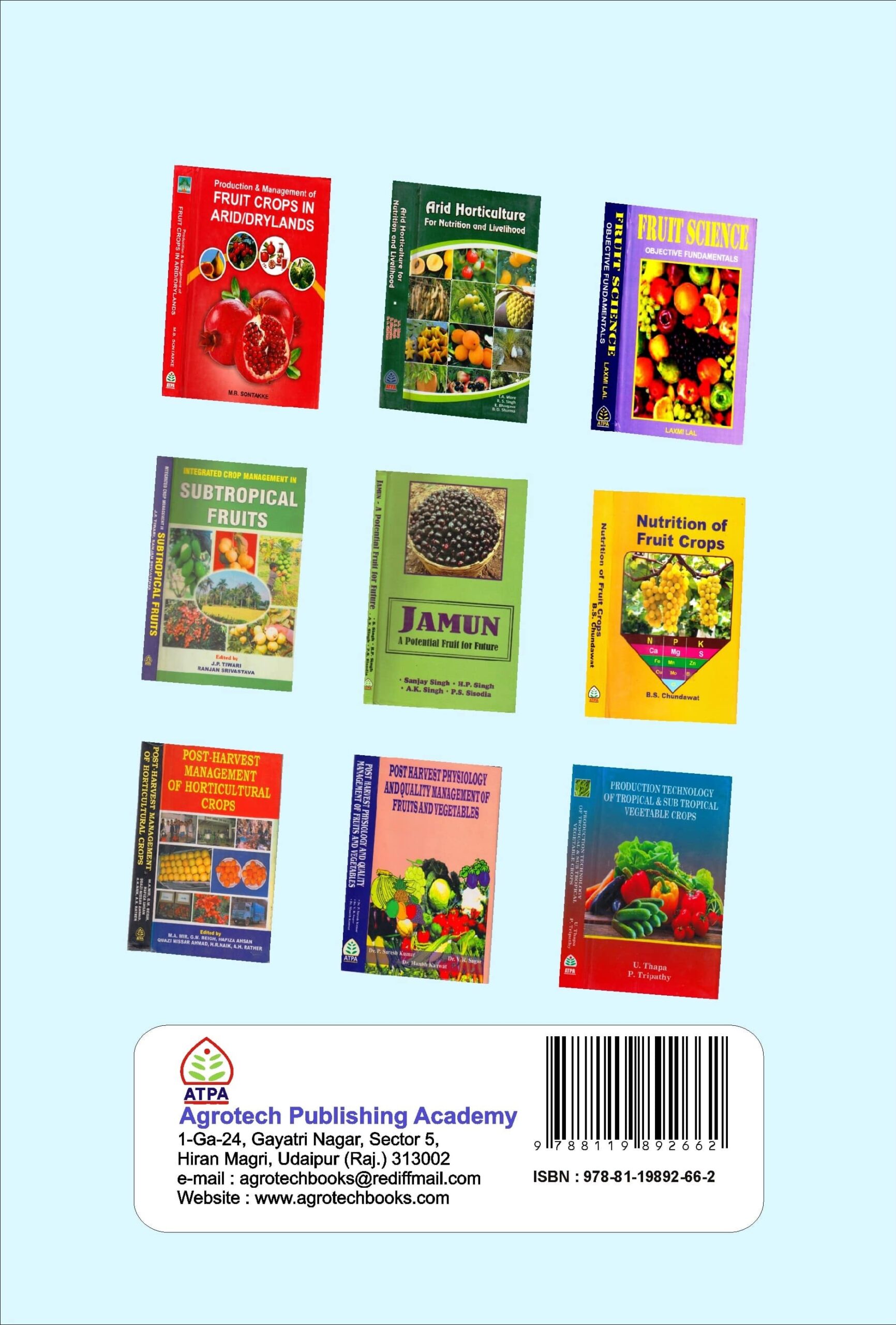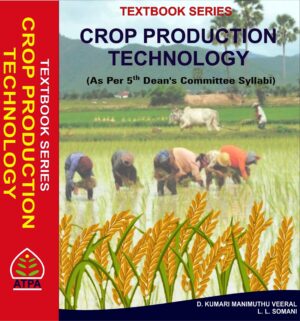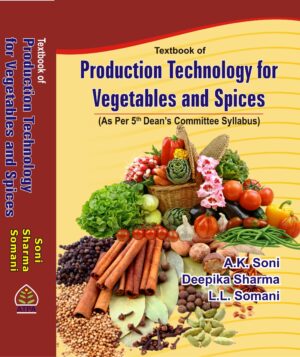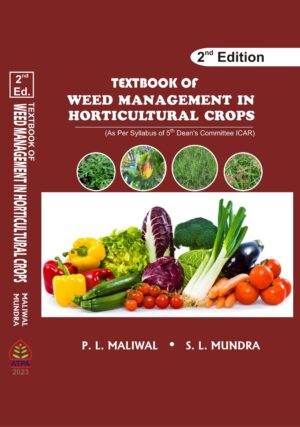TEXTBOOK ON MANAGERIAL SKILLS FOR EXTENSION PROFESSIONALS
₹990.00
AUTHORS: DHRITI SOLANKI, RAJSHREE UPADHYAY AND RISHIKA NEGI
PUBLISHING YEAR: 2024
ISBN: 9788119892662
© All Rights Reserved
Description
ABOUT THE BOOK
The book has been written to serve as a text book for students of all agricultural universities in India. The book serves to cover the contents of the advanced courses in the discipline of Extension Education as per BSMA recommendations. Various concepts, principles, theories and other important dimensions of management such as organizational climate, MBO,TQM,MIS, transactional analysis, time management, stress management, etc have been described in detail. The contents of the book will help students and Extension professionals to comprehend the important concepts of extension management required to improve their work proficiency.
CONTENT
| S. No. | Title | Page No. |
| PREFACE | ||
| ABOUT THE BOOK | ||
| ABOUT THE AUTHORS | ||
| CHAPTER | ||
| 1 | BASICS OF MANAGEMENT
Ø Characteristics of Management Ø Levels of Management Ø Principles of Management Ø Extension Management Ø ICT and Management Ø Problems and Issues of Extension Management in India Ø Functions of Management |
11-40
11 13 14 17 18
19 21 |
| 2 | MANAGERIAL SKILL
Ø Types of Managerial Skills Ø Levels of Managers Ø Managerial skills at various levels (Technical, Human and Conceptual skill) |
41-49
41 45
45 |
| 3 | THEORIES OF MANAGEMENT
Ø Scientific Management Theory Ø Administrative Theory Ø Bureaucracy Theory Ø Human Relation Theory Ø System Theory Ø Theory X Theory Y |
50-60
50 54 55 57 58 58 |
| 4 | STRATEGIC PLANNING
Ø Importance of strategic planning Ø Steps in Strategic Planning Process Ø Limitations of Strategic Planning Ø Techniques of Strategic Planning |
61-76
61 62 63 64 |
| 5 | RESOURCE MANAGEMENT
Ø Importance of Resource Management Ø Types of Organizational Resources Ø Resource Management Process Ø Resource Management Tips Ø Techniques to Streamline Resource Management |
77-82
77 77 79 80 81 |
| 6 | ORGANISATIONAL CLIMATE
Ø Dimensions of Organizational Climate Ø Determinants of Organizational Culture Ø Characteristics of Organizational Members Ø Developing an Organizational Climate Ø Factors Affecting Organizational Climate |
83-89
84 85 86 87 88 |
| 7 | MANAGEMENT BY OBJECTIVES
Ø Principles of MBO Ø Characteristics of MBO Ø Elements in the MBO Process Ø MBO Process Ø Benefits of MBO Ø Limitations of MBO |
90-97
91 91 92 93 95 96 |
| 8 | TRANSACTIONAL ANALYSIS
Ø Ego States Ø Life Position Ø Analysis of Transactions Ø Benefits of Transactional Analysis |
98-103
98 99 100 102 |
| 9 | TOTAL QUALITY MANAGEMENT
Ø Principles Governing the TQM System Ø Steps of TQM Ø Techniques of TQM Ø Benefits of TQM Ø Contributions of Deming’s Ø Barriers in TQM Implementation |
104-111
106 107 108 110 110 111 |
| 10 | LEARNING ORGANISATION
Ø Characteristics of Learning Organization Ø Benefits of Learning Organization Ø Need for Learning Organization Ø Values of Learning Organization Ø Practices of Learning Organization Ø Strategies for Developing a Learning Organization |
112-122
113 115 116 117 117
120 |
| 11 | TEAM BUILDING
Ø Importance of Team Building Ø Team Building Process Ø How to Build Highly Effective Teams Ø Advantages of Team Building Ø Disadvantages of Team Building Ø Strategies for Effective Team Building |
123-132
124 125 126 129 130 131 |
| 12 | MANAGEMENT INFORMATION SYSTEM
Ø Essentials of a good information system Ø Designing a Computer based MIS Ø Guidelines for Effective Design Ø Installation of MIS Ø Evaluate the MIS Ø Documentation of a manual information system Ø Applications of MIS Ø Major problems in MIS Ø Advantages of MIS |
133-142
134 135 136 137 138 139 139 141 141 |
| 13 | WORK MOTIVATION
Ø Characteristics of Work Motivation: Ø Process of Motivation Ø Factors Affecting Motivation at Work Ø Motivation Theories Ø Ways of Motivating Employees |
143-154
145 145 147 148 154 |
| 14 | TIME MANAGEMENT
Ø Benefits of Time Management Ø Time Management Practices at Work Ø Implications of Poor Time Management |
155-160
156 157 159 |
| 15 | STRESS MANAGEMENT
Ø Causes of Stress Ø Management of Stress (Individual & Organizational level strategies) Ø Self-Management Techniques Ø Importance of Self-Management in an Organization Ø Skills to Increase Self-Management Capabilities Ø Tips to Sharpen Self-Management Skills |
161-168
162
163 165
166
166 167 |
| BIBLIOGRAPHY | 169-170 | |
| E-REFERRENCE | 171-172 | |
ABOUT THE AUTHORS
Dr Dhriti Solanki obtained Master’s degree in Home Science Extension Education from RAU, Bikaner with gold medal and Ph.D. degree in Agricultural Extension from MPUAT, Udaipur. Presently working as Professor Extension Education and Communication Management in the College of Community and Applied Sciences, MPUAT, Udaipur. She has vast experience of 32 years in teaching , research and extension and was associated with five research projects , guided 17 students for Master and 9 for Doctoral research and conducted number of national and international trainings, seminars, conferences, webinars on the topics of national relevance. Has been actively involved in activities related to empowerment of rural and tribal women by organising number of Extension Activities viz. Trainings, Demonstrations, Exhibitions, Kisan Mela and Advisory Services. Published more than 80 research papers in reputed national and international journals, a book on dairy practices of women, practical manuals, compendium and chapters in edited books. Attended number of seminars, conferences and training programmes. Member of 12 professional societies related to Extension Education. Received Women Empowerment and Livelihood Award (2003) by Integrated Development of Women and Children, New Delhi, Sipni Krishi Anusandhan Farm award (2014) by AAHF, Hyderabad Scientist award by International Extension Forum, Coimbatore and A P J Abdul Kalam Lifetime Achievement Award by International Institute for Social and Economic Reforms, Bangaluru (2022).
Dr Rajshree Upadhyay is working as Professor in the Department of Extension Education and Communication Management, College of Community and Applied Sciences, MPUAT, Udaipur (Rajasthan). She obtained her Master’s degree in Home Science Extension Education and Ph.D. in Agriculture Extension from Rajasthan Agricultural University, Bikaner and qualified UGC NET and ASRB NET. She is actively involved in providing learning experiences to B.Sc., M.Sc. and Ph. D. students for more than 27 years, guided 26 M.Sc. and 06 Ph.D. students as major advisor and more than 80 students as member, advisory committee. She was associated with 2 research projects, published 109 research papers, two books, practical manuals, compendiums and several chapters in edited books. She is member of 9 professional societies and has organised number of seminars, workshops, webinars, expert lectures and extension activities for rural women. She has been awarded for her innovative and outstanding contribution in research and for best paper presentations in conference/seminars.
Ms. Rishika Negi has pursued graduation in Home Science from GBPUA&T Pantnagar, Uttarakhand and post-graduation in Home Science Extension from MPUAT Udaipur. She is presently pursuing Ph.D. Degree in Extension Education and Communication Management from MPUAT Udaipur, Rajasthan. She has received ICAR National Talent Scholarship for pursuing post-graduation and UGC NET Junior Research Fellowship for pursuing Ph.D. programme.
Additional information
| AUTHOR/AUTHORS | DHRITI SOLANKI, RAJSHREE UPADHYAY, RISHIKA NEGI |
|---|---|
| PAGES | 172 |
| BINDING | Hard Back |
| PUBLICATION YEAR | 2024 |





